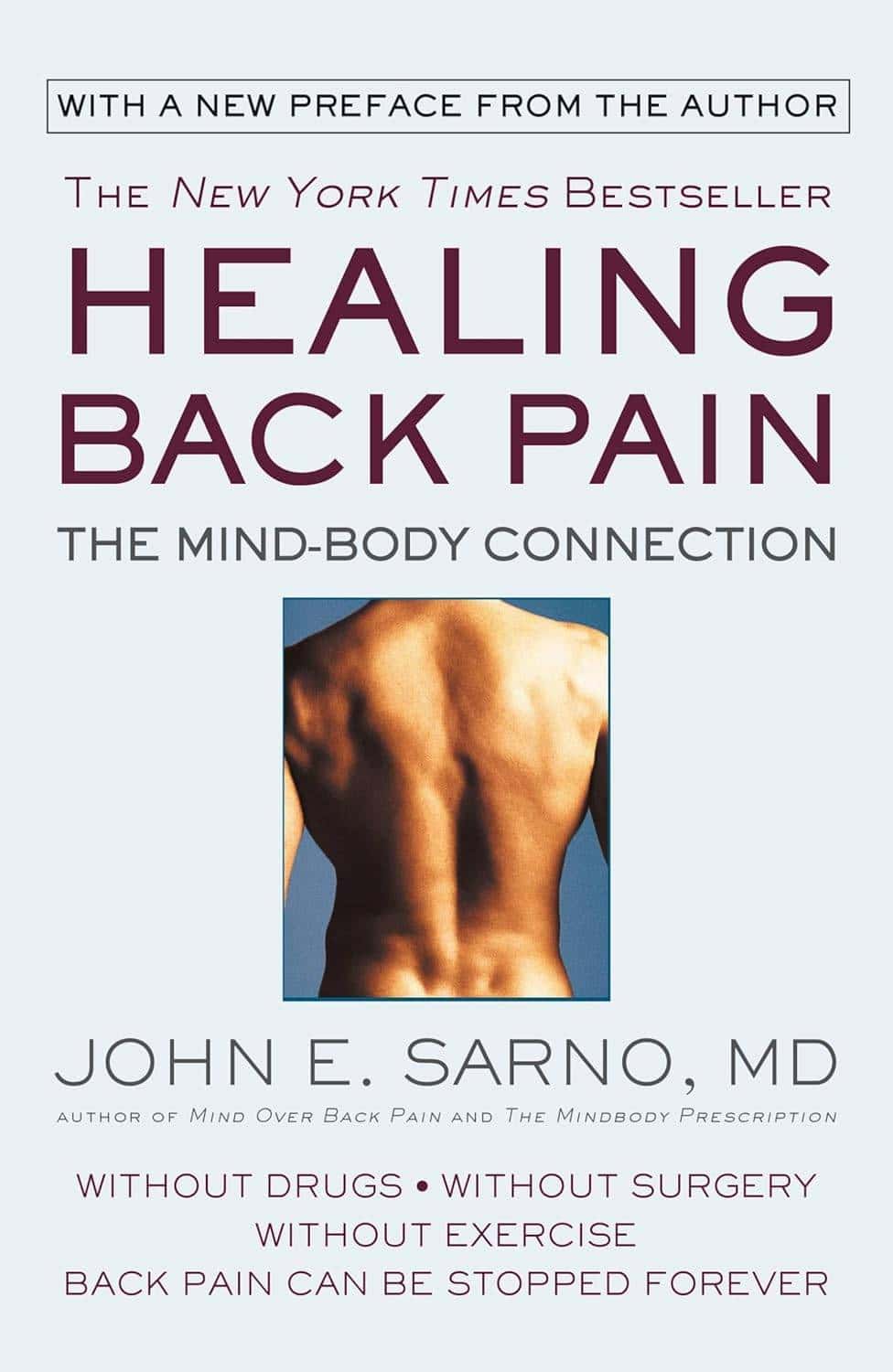“Ugh, my lower back is killing me!” is one of the most common sentences I hear on a daily basis! It’s a widespread issue, with 28% of U.S. adults reporting chronic low back or sciatic pain. Alarmingly, 44% of these individuals have suffered for over five years, significantly impacting their quality of life. These statistics highlight the need for effective treatments. While traditional approaches focus on physical causes, I’ve recognized the importance of psychological factors in physical well-being. Dr. John E. Sarno’s work, “Healing Back Pain,” introduces Tension Myoneural Syndrome (TMS), emphasizing the mind-body connection. I’ll share my thoughts on this perspective and how it relates to my experiences treating back pain.
Table of Contents
- Dr. John E. Sarno’s “Healing Back Pain”
- Understanding Tension Myoneural Syndrome (TMS)
- The Limitations of Conventional Medical Treatments
- The Psychological Factors Behind Chronic Pain
- My Perspective: A Balanced Approach
- Integrating TMS Insights into Treatment
- The Role of Chiropractic Care in Holistic Pain Management
- Case Studies: The Power of a Holistic Approach
- Embracing a Holistic View of Back Pain
- Conclusion
Dr. John E. Sarno’s “Healing Back Pain”
Dr. John E. Sarno’s groundbreaking work, “Healing Back Pain,” sheds light on the crucial mind-body connection in treating chronic pain, or any pain for that matter. This influential book introduces the concept of Tension Myoneural Syndrome (TMS) and offers a revolutionary perspective on understanding and treating back pain.
Modern Perspectives on Chronic Pain
Dr. Sarno’s ideas were groundbreaking and our understanding of chronic pain has evolved. Modern research shows that the connection between mind and body in pain is even more complex than we first thought. It turns out that sometimes pain can actually start in the brain, not just in response to physical issues. This has led to some pretty interesting new ways of managing pain that look at the whole person – their biology, psychology, and even their social situation
Experience the BodyFix Difference
Experience the difference that patient-centric, whole-body chiropractic care can make. Discover how The BodyFix’s unique approach addresses not just your pain, but your overall wellness for lasting results.
Understanding Tension Myoneural Syndrome (TMS)
What is TMS?
TMS, as described by Dr. Sarno, is a condition where emotional stress and repressed feelings manifest as physical pain, particularly in postural muscles like the neck and low back. It’s a fascinating theory that highlights how our bodies might use physical pain as a distraction from dealing with difficult repressed emotions. How clever the mind is to not deal with internalized issues!
The Role of Repressed Emotions
In my practice, I’ve observed how unresolved emotional issues can indeed contribute to and exacerbate any physical symptoms. Patients often bury feelings like anger, anxiety, and stress, unaware of how these emotions might be affecting their bodies, and can enhance pain that they may be already feeling. And I agree with Dr. Sarno that Western medicine is obsessively focused on the physical aspect of medicine and that every piece of evidence has to come by trial and error laboratory studies. Thinking emotional stress is causing physical ailments is thought of as borderline voodoo.

The Limitations of Conventional Medical Treatments
Surgery and Medication: A Band-Aid Approach?
While surgeries and medications have their place in treating many acute injuries, they often fall short in addressing chronic back pain in the musculoskeletal system.1 I’ve seen patients undergo multiple procedures or rely heavily on pain medications, only to find temporary relief at best.
The Pitfalls of Misdiagnosis
Dr. Sarno points out, and I agree, that there’s a tendency in medicine to over-attribute pain to structural abnormalities. This can lead to unnecessary treatments that don’t address the root cause of the pain which again he feels its phycological. Dr. Sarno thinks that most treatments create a placebo affect because those practitioners are hooked on the physical diagnosis with physical treatments. He includes any clinic that treats physical ailments including manual manipulation.
The Psychological Factors Behind Chronic Pain
You know, it’s fascinating how our early life experiences can shape our pain later on. Studies have found that things like childhood stress or hardship can make us more prone to chronic pain as adults. And get this – the way we think about pain can actually change how much it hurts2. If we catastrophize and imagine the worst, it can amp up the pain signals in our brains. It’s like our thoughts are turning up the volume on our pain.
Stress and Anxiety: Silent Pain Triggers
In my experience, stress and anxiety play a significant role in exacerbating back pain. Patients often report flare-ups during particularly stressful periods in their lives. We see it all the time. A patient will have her neck locked up with a restricted range of motion when we notice that she has projects due for work but when she is on vacation it states that “the neck doesn’t feel too bad today Doc.” Correlation? I think so.
Perfectionism and Pain
Interestingly, I’ve noticed that many of my patients with chronic back pain tend to be perfectionists or have high-stress personalities, especially in our Western culture. Getting that high salary, getting that expensive house and car, or making sure you look confident and successful on social media will contribute to these unnecessary pressures in life. In my opinion these examples align with Dr. Sarno’s observations about the typical emotional TMS sufferer.
My Perspective: A Balanced Approach
Acknowledging Both Mind and Body
While I find Dr. Sarno’s work incredibly valuable, I believe in a balanced approach. In my practice, I’ve seen cases where psychological factors are indeed the primary drivers of pain. I have sent people to psychosomatic practitioners when I feel it necessary as a cohesive approach to back pain. However, I’ve also encountered situations where structural issues play a significant role. I believe it’s more of a 50/50 approach.
Obviously, the mind drives thought which drives emotion. However, I do believe that the body can signal to the mind that there is pain somewhere that needs to be addressed on a physical basis.
Let’s look at an imaginative situation. What if I took a humanoid that has a human body but no mind or emotion like a robot? What if I gave that humanoid a sledgehammer and told it to hammer a heavy rubber tire until it ran out of power?
Now keep in mind this is a robot that has no anger, fear, or anxiety.
Do you think its body would ever have wear and tear to the point it would signal to its CPU (brain) that it has a problem? The point I’m trying to make is that I believe everything decays in life naturally and at times these structures can cause pain without an initial emotional stimulus. BUT we are not robots and have emotions that play a huge role in pain signaling. Again it’s about the balance between mind and body.
The Importance of Comprehensive Assessment
I always stress the importance of a thorough evaluation. This includes not just physical examinations and imaging, but also discussions about a patient’s emotional state, stress levels, and life circumstances.
While Dr. Sarno was onto something big, these days we’ve got even more tools in our toolbox. The experts at the Department of Health and Human Services now recommend a mix of approaches. They’re big fans of things like emotional awareness therapy, massage, and cognitive behavioral therapy.3 It’s all about finding what works best for each person.
The Mind-Body Connection in Neuropathy and Spinal Health
Interestingly, we feel our focus on neuropathy and spinal decompression aligns well with Dr. Sarno’s concept of TMS even though we think he would disagree. Many patients with these physical conditions also experience significant stress and emotional challenges, which can exacerbate their physical symptoms. I believe that the body can signal to the brain structural pain which can cause emotional pain.
The signaling can be a two-way street. By addressing both the physical and emotional aspects of these conditions, we’ve seen remarkable improvements in our patients’ overall well-being.
We use the knowledge from Dr. Sarno and tell patients about their emotional repression causing perpetuating physical pain but we also give mindful confidence to patients undergoing these physical treatments which they usually appreciate.
Now again Dr. Sarno would tell us that this is nonsensical because we are using physical treatments for a 100% psychological cause. Then at this point, we would have to agree to disagree.
Expert Diagnosis: The Foundation of Effective Treatment
One of our key selling points is our commitment to an expert structural diagnosis. But when we feel psychological is at hand we refer accordingly. Before recommending any treatment plan, we conduct a thorough assessment of each patient’s condition. This includes:
- Comprehensive physical examinations
- Review of medical history
- Advanced diagnostic imaging when necessary
- Evaluation of lifestyle factors and emotional well-being
This thorough approach ensures that we’re addressing the root cause of the pain or neuropathy, not just treating symptoms. This is where Dr. Sarno might disagree with us by telling us we don’t need imaging from a structural point of view because it would create further emotional fear and a further perpetuation on the mindset of a structural cause versus and psychological cause.
Integrating TMS Insights into Treatment
Education and Awareness
One of the most powerful tools we have is education. Helping patients understand the mind-body connection can be incredibly empowering and is often the first step toward healing.
Here’s something cool from recent pain science: chronic pain often involves a kind of ‘glitch’ in our nervous system.4 It’s like the pain alarm gets stuck in the ‘on’ position, even after the original structural problem is gone. So now, instead of just focusing on the physical symptoms, we’re looking at ways to ‘retrain’ the brain and nervous system. It’s pretty exciting stuff!
The Role of Chiropractic Care in Holistic Pain Management
While our focus has shifted more towards spinal decompression and neuropathy treatment, chiropractic care remains an integral part of our holistic approach. We often combine chiropractic methods with our specialized treatments to provide comprehensive care that addresses all aspects of a patient’s structural health.
Benefits of Chiropractic Adjustments
Chiropractic adjustments can offer several benefits:
- Pain Relief: Many patients experience immediate relief from pain after an adjustment. We don’t feel this is a placebo effect.
- Improved Mobility: By addressing spinal misalignments, chiropractic care can help restore range of motion. Couldn’t increasing this range immediately help a negative emotional status?
- Enhanced Body Awareness: Regular chiropractic visits can help patients become more attuned to their body’s signals and posture.
- Complementary to Other Treatments: Chiropractic care can work well alongside other treatments, including acupuncturists, massage therapists, and physical therapists. We have synergistically worked with traumatic psychosomatic practitioners in order to get patients full body holistic results.
Chiropractic Care and the Mind-Body Connection
Let’s dive into how chiropractic care beautifully complements our exploration of the mind-body connection in several intriguing ways:
- Stress Reduction: The physical act of an adjustment can help release tension, potentially reducing stress and anxiety. In fact, during our treatments, many of our patients innately release their emotional burdens through conversation which helps with that emotional release.
- Holistic Perspective: Many chiropractors take a whole-body approach, considering lifestyle factors that might contribute to pain.
- Non-Invasive Treatment: For patients wary of medication or surgery, chiropractic care offers a drug-free alternative that can be empowering.
When to Consider Chiropractic Care
I often recommend patients to consider chiropractic care:
- When they’re dealing with chronic back or neck pain
- If they’re looking for drug-free pain management options
- As part of a comprehensive treatment plan that includes addressing psychological factors (referring accordingly)
- To improve overall spinal health and posture which can improve mood
Choosing the Right Chiropractor
If you’re considering chiropractic care, it’s important to choose a practitioner who:
- Is licensed and has good credentials
- Takes a thorough health history and performs a comprehensive examination
- Is willing to work as part of your overall healthcare team
- Understands and appreciates the mind-body connection in order to eliminate pain once and for all instead of managing it.

Integrating Chiropractic Care into Your Pain Management Plan
Chiropractic care is most effective when it’s part of a holistic approach to health. Consider combining chiropractic visits with the following:
- Stress-reduction techniques like meditation or yoga
- Regular exercise and stretching routines
- Mindfulness practices to enhance body awareness
- Open communication with all your healthcare providers about your treatment plan
While chiropractic care can be highly beneficial, it’s important to approach it as one part of a comprehensive strategy. By combining the physical benefits of chiropractic adjustments with awareness of the mind-body connection and other therapeutic approaches, you can create a powerful, personalized plan for not only managing your back pain but taking control of your life.
Case Studies: The Power of a Holistic Approach
At our practice, we’ve had the privilege of helping many patients overcome their pain and improve their quality of life. Here are two stories that highlight the impact of our holistic approach:
BodyFix Patient-Brian Andrews: An Athlete’s Journey to Peak Performance
Brian, a lifelong athlete, came to us seeking to improve his overall physical condition. Here’s what he had to say about his experience:
“Dr. Mario is great! From the moment you walk in the door, you will feel so welcomed! I’ve been an athlete my whole life, and in just a couple of visits, Dr. Mario has been able to work with me and have me feeling the best I’ve felt in years! I would definitely recommend any high-level athlete or average Couch Potato to go and check them out. They will have you feeling better than you ever have.”
BodyFix Patient- Drayton Tuten: Long-Term Care and Continuous Improvement
Drayton has been a patient of ours for several years, experiencing the benefits of consistent, personalized care. Here’s his testimonial:
“I have been going to Dr. Mario for a few years now. I cannot express how amazing his practice is for me. I had a great first experience with him and it just keeps getting better and better. Out of all the chiropractors I have been to, he’s the first one who takes his time and doesn’t rush through anything. He goes over and beyond! I feel so much better and I can definitely move around so much more. I cannot say enough good things about his practice. Do yourself a favor and go see for yourself!”
These testimonials reflect our commitment to providing personalized, effective treatment that addresses both the physical and emotional aspects of health and well-being. Whether you’re an athlete looking to perform at your best or someone seeking relief from chronic pain, our holistic approach can help you achieve your health goals.
Embracing a Holistic View of Back Pain
Dr. Sarno’s work on TMS has undoubtedly revolutionized our understanding of chronic pain. While I believe that structural issues can and do contribute to back pain, I’ve seen firsthand the powerful impact of addressing psychological factors as a causative factor in pain.
We must consider the whole person – mind, body, and personally I would include spirit as a third aspect – when treating chronic pain. For patients, understanding this mind-body connection can be the key to unlocking a pain-free life.
Experience the BodyFix Difference
Experience the difference that patient-centric, whole-body chiropractic care can make. Discover how The BodyFix’s unique approach addresses not just your pain, but your overall wellness for lasting results.
Conclusion
While we’ve learned a lot since Dr. Sarno first shook things up, his big idea still holds true – our minds and bodies are deeply connected when it comes to pain. These days, we recognize that all pain is real, no matter where it comes from. And the best way to tackle it? Well, that usually means looking at both the mental and physical sides of things. It’s all about treating the whole person, not just the pain.
Chronic pain, whether in your back, or neck or stemming from neuropathy, is complex. There’s no one-size-fits-all solution. But by embracing a holistic approach that combines advanced physical treatments with attention to emotional well-being, we’ve helped numerous patients reclaim their lives from pain.
I am actually very thankful for this great read because it challenged me personally at what we do in our clinic. Essentially Dr. Sarno would tell me that our clinics’ physical treatments have a placebo effect on the human mind. But as I have explained above, we can work backwards treating the physical structures and releasing the emotional painful traps. Thank you Dr. Sarno for putting me in a psychological corner and making me come out and justify our clinics’ services and claims! Your book has made me a better practitioner.
Book your initial assessment today! During this comprehensive evaluation, we’ll discuss your symptoms, medical history, and goals to create a personalized treatment plan.
Blog Disclaimer: The information provided on The BodyFix Chiro blog is for general informational and educational purposes only and is not intended as medical advice. These articles reflect our opinions and experiences but should not be used to diagnose or treat any health conditions. Always consult with your physician, chiropractor, or other qualified healthcare provider before starting any new treatment, exercise program, or making changes to your health routine. Any actions you take based on information from this blog are entirely at your own risk, and The BodyFix Chiro and its contributors disclaim any liability for the decisions you make based on this information.




